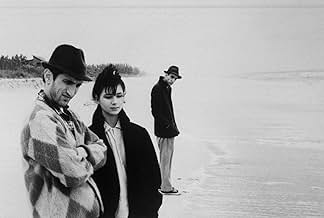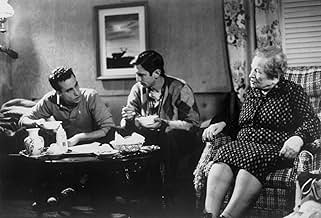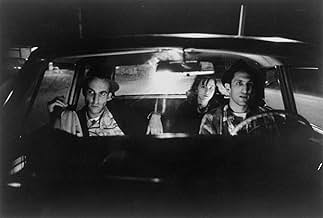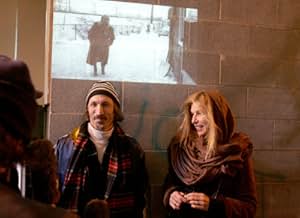Stranger Than Paradise
- 1984
- Tous publics
- 1h 29min
NOTE IMDb
7,4/10
42 k
MA NOTE
La vie d'un New-Yorkais prends un mauvais tournant quand sa jeune cousine lui rend visite et que commence une étrange aventure imprévisible.La vie d'un New-Yorkais prends un mauvais tournant quand sa jeune cousine lui rend visite et que commence une étrange aventure imprévisible.La vie d'un New-Yorkais prends un mauvais tournant quand sa jeune cousine lui rend visite et que commence une étrange aventure imprévisible.
- Réalisation
- Scénario
- Casting principal
- Récompenses
- 8 victoires et 2 nominations au total
Avis à la une
"Stranger than Paradise" (1984): Jim Jarmusch's first film. Often listed as a "comedy" and yes, I suppose there ARE a few oddly funny moments for the most part I find it an intensely bleak film, empty of almost all life but for a few lone cruiser characters who are detached from everyone else. The photography is astoundingly beautiful black & white. They are almost shot as individual stills with minor movements in them, and divided by blatant black divisions, which one can think of as the black pages of an old photo album. The velvety rich blacks, grays, and whites, plus the composed "still" scenes, cause me to think Jarmusch was trained as a static, 2-D artist first. Just a guess. This film is NOT about acting, which is limited at best, but doesn't really need much. We observe an alienated set of scenarios which are only enhanced by the stiff, awkward exchanges and pauses of the characters, and the lack of movement in the camera work. Ambient sound adds to the gritty reality of emptiness. Funny or not, this is a low-key, lost-souls story of detachment and aimlessness.
Odd and inspiring. This film rings true with rich detail in its depictions of utter loneliness. Smoking many Chesterfields, watching television, playing solitaire, visiting Aunt Lottie, sightseeing at Lake Erie (for God's sake). It alters from tragic to comic from almost moment to moment, and often has a foot in both pools.
Jarmusch is minimalist to the core with this one, and yet manages to pull off a solid story. A small black and white gem that deserves a larger audience.
Jarmusch is minimalist to the core with this one, and yet manages to pull off a solid story. A small black and white gem that deserves a larger audience.
The New World: The teenager Eva Molnar (Eszter Balint) arrives from Budapest, Hungary, and goes to the house of his cousin Willie, a.k.a. Bela Molnar (John Lurie) in a dangerous neighborhood in New York. Eva intends to travel to Cleveland to stay with her Aunt Lotte (Cecillia Stark), but the old woman is in the hospital and Eva has to stay with the idle Wille, who is absolutely indifferent to her. They spend their empty days smoking Chesterfield, watching television and playing solitaire and Eva befriends Willie's friend Eddie (Richard Edson). Then Willie and Eddie are connected to Eva and they miss her when she travels to Cleveland.
One Year Later: Willie and Eddie win a large amount in the poker game and they borrow a car and travel to Cleveland to visit Eva. They spend a couple of boring days in the house of Aunt Lotte.
Paradise: Willie and Eddie invite Eva to go on vacation in Florida. However they lose their money in the dog racing. Willie decides to bet their last money in the horse racing and they win money. Meanwhile Eva is wrongly taken by another woman and receives a large amount from a stranger. She leaves money for Willie and Eddie and goes to the airport expecting to travel to Europe, but there is only one flight to Budapest. Meanwhile Willie and Eddie seek her out in the airport. Will Willie find Eva?
"Stranger than Paradise" is an ironic and weird tale of emptiness and boredom by Jim Jarmusch, filmed in black and white and divided in three segments (acts). There are funny moments, like for example, when Willie has a phone conversation with his Aunt Lotte and tells that Eva will put his life on hold since the guy spends the days smoking, watching television, playing solitaire and gambling in the horse racing. Then he misses Eva, probably the only different thing that had happened in his boring and empty life. In the end, it is hilarious when Eddie asks to himself: What will Willie do in Budapest? "Stranger than Paradise" is not for every audience but those viewers that also enjoy cinema as art. My vote is eight.
Title (Brazil): "Estranhos no Paraíso" ("Stranger in the Paradise")
One Year Later: Willie and Eddie win a large amount in the poker game and they borrow a car and travel to Cleveland to visit Eva. They spend a couple of boring days in the house of Aunt Lotte.
Paradise: Willie and Eddie invite Eva to go on vacation in Florida. However they lose their money in the dog racing. Willie decides to bet their last money in the horse racing and they win money. Meanwhile Eva is wrongly taken by another woman and receives a large amount from a stranger. She leaves money for Willie and Eddie and goes to the airport expecting to travel to Europe, but there is only one flight to Budapest. Meanwhile Willie and Eddie seek her out in the airport. Will Willie find Eva?
"Stranger than Paradise" is an ironic and weird tale of emptiness and boredom by Jim Jarmusch, filmed in black and white and divided in three segments (acts). There are funny moments, like for example, when Willie has a phone conversation with his Aunt Lotte and tells that Eva will put his life on hold since the guy spends the days smoking, watching television, playing solitaire and gambling in the horse racing. Then he misses Eva, probably the only different thing that had happened in his boring and empty life. In the end, it is hilarious when Eddie asks to himself: What will Willie do in Budapest? "Stranger than Paradise" is not for every audience but those viewers that also enjoy cinema as art. My vote is eight.
Title (Brazil): "Estranhos no Paraíso" ("Stranger in the Paradise")
Life is strikingly uneventful for Willie, played by renaissance man John Lurie, who refers to himself as a hipster and lives in New York City, and his interactions with his Hungarian cousin Eva, played by avant-garde actress-musician Eszter Balint, and his best friend Eddie, played by yet another actor-musician Richard Edson, who dresses exactly like Willie. Indeed, both males are swarthy with hook noses and fedoras. They have such little interest in or knowledge of anything that their eventual vacation is no different from home.
The quirky way to three-act story format is a succession of single-shot scenes punctuated by black leader, and the clear-cut partition of the story into three straightforward, facetiously named episodes. Yet there are other ceremonial characteristics of substance: Tom DiCillo's black-and-white camera work, which provides Jarmusch's acute impression for the American panorama; and the arresting appliance of music, which favorably apposes Screamin' Jay Hawkins's I Put a Spell on You with the folksy tinges of John Lurie's score for string quartet. This is definitely a road movie, but one with a distinction: Different from most instances of the then still immensely fashionable genre, Stranger Than Paradise appeared simultaneously comprehensively American and strangely European.
The oddly enlightening aggregate of involvement and reserve may be found in the film's lovingly absurd view of Willie's chic affectations, its quaint posture toward some of the inanities of American culture and in the way it harmonizes a decidedly American genre and decidedly American plot---if a narrative as gravely sparse and as concentrated on dead moments may be dubbed a plot---with all form of un-Hollywood expression. The look, rhythm, cast and mainly dismal feel bring to mind not The Blues Brothers, or even the rather subdued Last Detail, but the beginnings of the degree of minimalism to which Jarmusch would take his later work.
However he also loves various attributes of popular culture. See how Willie and Eva watch Forbidden Planet on TV or go with Eddie and Eva's discouraged fancier to see a bone-crunching Hong Kong martial-arts flick at a Cleveland grindhouse, and lets them neighbor more virtuous aspects of his films, in such a way that there is no discrepancy between high and low. And it's for that scarce but wholly judicious mindset that Jarmusch is to be particularly noted. It's doable to distinguish his connection with a gamut of later American indie directors, specifically in his desert drollery, his passionately entertained captivation with slackers of sundry kinds, his concern with sequential framework, his affinity for severely subdued stories, and his clever, antiquated references to popular culture. All these, at a time scarce in American cinema, are now pretty ubiquitous. But the rhyme, the unabashed regard for cinema as a quality, production, expression, a realm, according to aesthetic principles, of what is beautiful, appealing, or of more than ordinary significance, even the mundanities of life and the most everyday scenery possible, that can confront crucial, important matters is far more difficult to come across.
Considering, in the end, no matter how amusing, stylized, minute or insignificant his films may strike one at first, they are always about something. For all his cinephilia, they're inspired not, like Tarantino and Rodriguez, by other movies, but by life: by real people, encountering real feelings. And while this black-and-white deadpan pop culture satire may be a comedy, an dissection of cinematic storytelling, and a thoroughly cynical yarn, it's also a film about America and the people who live there. It's about those people's connections to each other, and their connections to the rooms they populate, the city streets, the suburbs, diners and highways. And it's made by someone who knows there may be reality in abstraction, who finds a visceral alliteration separating a snow-coated Lake Erie and a barren Florida beach, and who fashions an implausibly true character like Aunt Lotte, always jabbering to her tender company in Hungarian, whether they're listening or not.
The quirky way to three-act story format is a succession of single-shot scenes punctuated by black leader, and the clear-cut partition of the story into three straightforward, facetiously named episodes. Yet there are other ceremonial characteristics of substance: Tom DiCillo's black-and-white camera work, which provides Jarmusch's acute impression for the American panorama; and the arresting appliance of music, which favorably apposes Screamin' Jay Hawkins's I Put a Spell on You with the folksy tinges of John Lurie's score for string quartet. This is definitely a road movie, but one with a distinction: Different from most instances of the then still immensely fashionable genre, Stranger Than Paradise appeared simultaneously comprehensively American and strangely European.
The oddly enlightening aggregate of involvement and reserve may be found in the film's lovingly absurd view of Willie's chic affectations, its quaint posture toward some of the inanities of American culture and in the way it harmonizes a decidedly American genre and decidedly American plot---if a narrative as gravely sparse and as concentrated on dead moments may be dubbed a plot---with all form of un-Hollywood expression. The look, rhythm, cast and mainly dismal feel bring to mind not The Blues Brothers, or even the rather subdued Last Detail, but the beginnings of the degree of minimalism to which Jarmusch would take his later work.
However he also loves various attributes of popular culture. See how Willie and Eva watch Forbidden Planet on TV or go with Eddie and Eva's discouraged fancier to see a bone-crunching Hong Kong martial-arts flick at a Cleveland grindhouse, and lets them neighbor more virtuous aspects of his films, in such a way that there is no discrepancy between high and low. And it's for that scarce but wholly judicious mindset that Jarmusch is to be particularly noted. It's doable to distinguish his connection with a gamut of later American indie directors, specifically in his desert drollery, his passionately entertained captivation with slackers of sundry kinds, his concern with sequential framework, his affinity for severely subdued stories, and his clever, antiquated references to popular culture. All these, at a time scarce in American cinema, are now pretty ubiquitous. But the rhyme, the unabashed regard for cinema as a quality, production, expression, a realm, according to aesthetic principles, of what is beautiful, appealing, or of more than ordinary significance, even the mundanities of life and the most everyday scenery possible, that can confront crucial, important matters is far more difficult to come across.
Considering, in the end, no matter how amusing, stylized, minute or insignificant his films may strike one at first, they are always about something. For all his cinephilia, they're inspired not, like Tarantino and Rodriguez, by other movies, but by life: by real people, encountering real feelings. And while this black-and-white deadpan pop culture satire may be a comedy, an dissection of cinematic storytelling, and a thoroughly cynical yarn, it's also a film about America and the people who live there. It's about those people's connections to each other, and their connections to the rooms they populate, the city streets, the suburbs, diners and highways. And it's made by someone who knows there may be reality in abstraction, who finds a visceral alliteration separating a snow-coated Lake Erie and a barren Florida beach, and who fashions an implausibly true character like Aunt Lotte, always jabbering to her tender company in Hungarian, whether they're listening or not.
I honestly think this is a film that people are afraid to admit they don't find funny or like. I read reviews from critics blasting films for not having enough plot, for being boring, for being poorly written, poorly acted, etc. And here is a film with all these negative attributes, and it's considered a classic.
I went to film school with Ms. Balint and wanted desperately to like this film, watching it as much as four times -- twice on tape and twice on A&E. I did not find all those attributes others had christened it with because frankly, they do not exist. Then I remember The Elephant Man, and the early critics using the title to savage it; "It moves at an elephant's pace", read one. Then everyone jumped on the bandwagon and never a bad word about the film again. I think this is the case for Stranger Than Paradise. The film presents the boredom and monotony of three lost people's lives, and it succeeds by itself being boring and monotonous.
I also think viewers have to put more into this film to seek enjoyment, just as an art critic will look at a solid black canvas and see the life cycle of man's humanity and mortality. And the fact is, it's just a black canvas. That is what I think this movie is. I just happen to think that it caught the people at Cannes during an odd time where they found it amusing, and then from that time out, everyone was afraid to say anything negative about it for fear of being ridiculed for "not getting it." In my opinion -- and acknowledging everything regarding the arts is subjective -- this is an average, gimmicky (mastershots and blackouts) student film.
I would rate this film 1/2 star, if that at all. Sorry to disagree with all you intellectuals out there. I enjoy a good classic film, domestic or foreign, but I do not like films that sportnon-existent writing, acting, or direction. To be snide, I've seen the Emperor, and that b*****d is buck-naked.
I went to film school with Ms. Balint and wanted desperately to like this film, watching it as much as four times -- twice on tape and twice on A&E. I did not find all those attributes others had christened it with because frankly, they do not exist. Then I remember The Elephant Man, and the early critics using the title to savage it; "It moves at an elephant's pace", read one. Then everyone jumped on the bandwagon and never a bad word about the film again. I think this is the case for Stranger Than Paradise. The film presents the boredom and monotony of three lost people's lives, and it succeeds by itself being boring and monotonous.
I also think viewers have to put more into this film to seek enjoyment, just as an art critic will look at a solid black canvas and see the life cycle of man's humanity and mortality. And the fact is, it's just a black canvas. That is what I think this movie is. I just happen to think that it caught the people at Cannes during an odd time where they found it amusing, and then from that time out, everyone was afraid to say anything negative about it for fear of being ridiculed for "not getting it." In my opinion -- and acknowledging everything regarding the arts is subjective -- this is an average, gimmicky (mastershots and blackouts) student film.
I would rate this film 1/2 star, if that at all. Sorry to disagree with all you intellectuals out there. I enjoy a good classic film, domestic or foreign, but I do not like films that sportnon-existent writing, acting, or direction. To be snide, I've seen the Emperor, and that b*****d is buck-naked.
Le saviez-vous
- AnecdotesDirector Jim Jarmusch was dismayed to discover all the money he paid for the rights to Screamin' Jay Hawkins' "I Put a Spell on You" went to the record company, with nothing going to Hawkins himself. When the film earned a profit, Jarmusch took it upon himself to track down Hawkins (who was living in a trailer park, at the time) and give him some money. It was the beginning of a friendship that lasted until Hawkins' death. According to Jarmusch, Hawkins continuously swore he'd pay him back, despite Jarmusch's insistence that the money was a gift.
- GaffesWhen Eddie and Willie are driving to Cleveland, the camera and camera operator can be seen in the reflection of the rear view mirror.
- ConnexionsEdited from Stranger than Paradise (1983)
- Bandes originalesI Put a Spell on You
Written by Screamin' Jay Hawkins (as Jay Hawkins)
Used by permission of CBS Unart Catalog, Inc.
All Rights Reserved.
Performed by Screamin' Jay Hawkins
Courtesy of CBS Records
Meilleurs choix
Connectez-vous pour évaluer et suivre la liste de favoris afin de recevoir des recommandations personnalisées
- How long is Stranger Than Paradise?Alimenté par Alexa
Détails
- Date de sortie
- Pays d’origine
- Langues
- Aussi connu sous le nom de
- Extraños en el paraíso
- Lieux de tournage
- 464 Newark St, Hoboken, New Jersey, États-Unis(Corner building when Eva first arrives and walks to apartment)
- Sociétés de production
- Voir plus de crédits d'entreprise sur IMDbPro
Box-office
- Budget
- 90 000 $US (estimé)
- Montant brut aux États-Unis et au Canada
- 2 436 000 $US
- Montant brut mondial
- 2 454 393 $US
- Durée1 heure 29 minutes
- Couleur
- Rapport de forme
- 1.85 : 1
Contribuer à cette page
Suggérer une modification ou ajouter du contenu manquant

Lacune principale
By what name was Stranger Than Paradise (1984) officially released in India in English?
Répondre




























